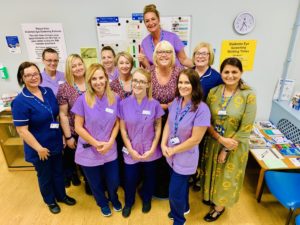 The evaluation, which took place back in March, found that the service was thorough, friendly and took the patient’s individual needs into account, achieving all national performance standards.
The evaluation, which took place back in March, found that the service was thorough, friendly and took the patient’s individual needs into account, achieving all national performance standards.
DESPs are vital when it comes to eye care, as they are used to check for a condition called diabetic retinopathy, one of the most common causes of blindness in the UK. This illness is brought on by high blood sugar levels and can do permanent damage if not detected early enough. Diabetic retinopathy may not cause symptoms until it is quite advanced and close to affecting a person’s sight, which is why it is so important to have a high-quality screening programme in place.
Speaking about the recent evaluation, Dr Shivani Dewan, Consultant in Diabetes and Endocrinology at DBTH, said: ‘’We know that our screening programme is excellent and to have this recognised by an external assessor is a huge accomplishment. I am so proud of our team and would like to thank them for all their efforts, as we have managed to achieve 100% on all the standards that we have been measured against.’’
Residents of Doncaster, Worksop and the Dearne Valley can rely on an exceptional diabetic eye service, which has been going strong for over 13 years. Everyone aged 12 and over with diabetes receives an invitation to screen once a year, with an appointment taking around 30 minutes. The DESP team have engaged with harder to reach areas, including the Travelling Community, prisons and people with mental health issues to encourage them to attend for appointments, so that they can also receive high quality care.
During the recent quality assurance visit, which was conducted by members of the National Eye Screening Team, assessors spoke to both staff and visitors and considered evidence according to the national specification. Their findings were incredibly positive, recognising that colleagues were enthusiastic and always treated their patients as real people.
They also noted that the Doncaster and Bassetlaw Diabetes Eye Screening Programme is unique because it looks at diabetes as a whole, rather than focussing solely on eye screening. This more comprehensive examination means that there is a greater chance of identifying any problems, enabling clinicians to signpost patients to the right place for treatment. The assessor was very impressed by this in-depth service and praised the staff for their hard work and dedication.



